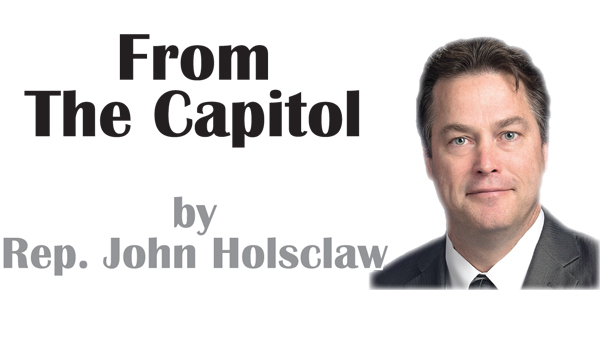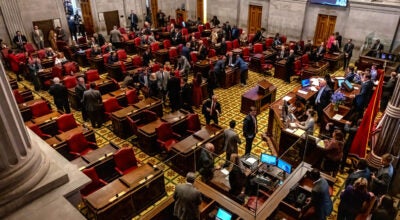State Rep. John Holsclaw offers weekly Capitol Hill Review
Published 2:49 pm Friday, January 28, 2022
|
Getting your Trinity Audio player ready...
|
FROM STAFF REPORTS
On Friday, State Rep. John Holsclaw (R-District 4), released a weekly wrap up of what took place during meetings of the 112th General Assembly in the past week. Included in the report are several topics important to many Tennesseans.
General Assembly honors fallen U.S. Army major, family
The General Assembly honored family and friends of fallen U.S Army Maj. Trevor Joseph on Monday, Jan. 24. State Rep. Kevin Vaughan, R-Collierville, and members of the Veterans Caucus also presented the family with framed copies of the Major Trevor Joseph Act and a resolution honoring the fallen solider. Joseph, a Collierville native and medical services officer, was killed when his helicopter crashed while attempting to recover a soldier in Fort Polk, La., in 2019. At the time, his family requested that he be buried in the state veterans’ cemetery on a weekend to accommodate friends and family who wished to attend the ceremony. However, he was required to be interred on a weekday. Last year, state lawmakers passed the Major Trevor Joseph Act to ensure that those who make the ultimate sacrifice are given a proper burial service that aligns with their family’s requests. The legislation requires the Department of Veterans Services to provide burial services for a person who died while on active duty with the United States armed forces, Tennessee National Guard or Tennessee Air National Guard and is being interred in a state veterans’ cemetery on a date requested by the family members of the person if the department is given at least 72 hours’ notice for the burial. According to the Tennessee Department of Veterans Services, two weekend military burials have taken place since the Major Trevor Joseph Act was signed into law.
The General Assembly approves final redistricting plan
New redistricting maps received final approval by both chambers this week. House Bill 1034, House Bill 1035 and House Bill 1037 now head to Gov. Bill Lee’s desk for his signature. Every 10 years, new House, Senate and Congressional maps are drawn to reflect population changes based on U.S. Census data. The plan complies with all state and federal requirements in the Voting Rights Act and is reflective of Tennessee’s growth. The final concept ensures equal representation for all Tennesseans. Key Redistricting Plan highlights:
U.S. growth was 7.4 percent
Tennessee’s population grew 8.9 percent, growing from 6,346,105 in 2010 to 6,910,840 in 2020
Ideal district size increased from 64,102 to 69,806
17 counties grew by more than 10 percent. Middle Tennessee had the highest growth
30 counties experienced negative growth compared to only eight in 2010 — Rural West Tennessee,
the Upper Cumberland region and Northeast Tennessee had the lowest growth
This caused a three-seat shift in representation to Middle Tennessee from other parts of the state
There are 30 split counties — nine in West Tennessee, nine in Middle Tennessee, and 12 in East
Tennessee
Seven districts have paired incumbents and eight are without incumbents.
This concept maintains the current number of majority/minority districts — 13
Six districts remain unchanged
Republicans reclaim religious freedom and personal liberty for Tennessee’s health care workers
Tennessee Republicans are again leading the fight against President Joe Biden’s forced government discrimination and unconstitutional plan to deny Americans their right to make personal health decisions for themselves. House Bill 1867 requires an employer with a mandatory COVID-19 vaccination policy to grant an exemption for medical or religious reasons to anyone who requests to be exempt. The bill also specifies that medical practitioners are protected from civil liability and threat of disciplinary action by health-related boards for providing medical exemptions.
“Health care workers have carried us through this public health crisis for two years,” said the bill’s lead sponsor, State Rep. Jason Zachary, R-Knoxville. “They are the heroes on the front lines of this pandemic. Some of them have made a personal decision to not get vaccinated and their choice should be respected.” The U.S. Supreme Court on Jan. 12 struck down the Biden administration’s vaccine or testing mandate for employers with more than 100 employees. The high court allowed a policy requiring vaccinations for the health care workers at facilities that receive Medicaid and Medicare funds. There is no testing alternative for health care workers. The mandate was issued by the U.S. Department of Health and Human Services’ Centers for Medicare and Medicaid Services on behalf of the Biden administration. It applies to more than 10 million health care workers nationwide. Those that don’t comply face losing their jobs. House Bill 1867 adds an additional layer of protection for Tennessee’s health care workers who do not want to be vaccinated. For more about House Bill 1867, visit here.
State of the State address set for Jan. 31
Gov. Bill Lee will deliver his fourth State of the State address to members of the General Assembly and Tennesseans on Monday, Jan. 31, at 6 p.m. Central Standard Time (CST). The joint session will be in the House chamber at the Tennessee State Capitol in Nashville. Lee is expected to discuss his legislative agenda for the year as well as his proposed budget for 2022-23. The address may be viewed on Gov. Lee’s Facebook and YouTube channels and will be aired statewide.
Briefly…
The Tennessee Department of Labor and Workforce Development this week reported the seasonally adjusted unemployment rate fell from 4 percent in November 2021 to 3.8 percent in December 2021. The unemployment rate decreased in five counties, increased in 87 counties and remained the same in three counties. Williamson County reported the lowest rate at 2.1 percent while Perry County reported the highest rate at 7.9 percent. During the same time period, the seasonally adjusted unemployment rate for the United States decreased from 4.2 percent to 3.9 percent.






